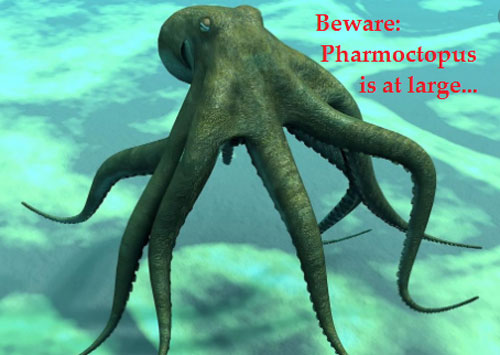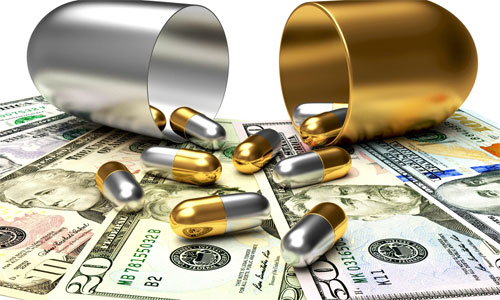COVID19 slog special investigation: how Big Pharma’s tentacles have the NHS by the throat
None of what follows (except where expressly pointed out) is derived from leaks and whistleblowers. Simply Google ‘Pharmaceutical sector donations to the NHS’ and you will see all the reports and sources for the facts outlined below.

So far, the emphasis in Western criticisms of the pro-Pharma/vaccination narrative has focused on corporate monies providing an obvious moral hazard for everyone from Anthony Fauci to Neil Ferguson and Peter Horby – i.e., those in research and bureaucratic positions. But in Britain, we have the national health service (NHS) – the biggest single buying point for pharmaceuticals in the world.
The following investigation shows that Pharmoctopus is strangling objectivity in the NHS (and other european taxpayer public health provision) just as much as everywhere else infected by monied lobbying, aka bribery… and this has been going on for a long time. Worst of all, it is clear that Big Pharma ends up making a profitable return on the donations.
An investigation by Bath University researchers into NHS donations by Big Pharma and other industry bodies found the number of donations between 2014 and 2016 rose by a third and the value more than doubled.
Over several years, the British Medical Journal (BMJ) in turn examined secretive but systematic donation marketing among NHS patient groups. Almost half the funding was primarily earmarked for campaigning or awareness activities in relation to its drug brands, the BMJ report’s authors claimed. They said a lack of transparency over how funding is reported means there was significant scope for this type of funding to shift the focus of major charities and policy makers into areas of commercial benefit.
“Without necessarily determining the content of the funded activities, firms could shape the profiles of patient organisations through heavy investment in their external activities,” lead author Dr Piotr Ozieranski and colleagues said.
But Pharmoctopus gets two bites at the cherry, because the drugs they market were often developed via taxpayer foundation funding. The NHS is spending millions of pounds on medicines that were discovered with taxpayer-funded research, in what has been branded a “rip-off” by major pharmaceutical companies on the British public.

Figures released by the Missing Medicines Coalition on World Cancer Day in 2019 showed that during 2017-18, three of the five most expensive cancer drugs to the NHS last year were developed from publicly-funded research. As a result the public are paying twice for medicines – first for the research and then in high prices to the drug industry.
We’re not talking small amounts here. The NHS spends £18 billion a year on drugs; but treatments for cancer, arthritis and multiple sclerosis (MS) are among drugs that cost the cash-strapped NHS more than £1bn last year – despite public funding playing a substantial role in the medicines’ development.
A new report by STOP AIDS and Global Justice Now shines a light in 2017 on the level of UK public money used to develop new drugs, with two out of five of the NHS’s most expensive drugs discovered using substantial public money. Says a senior NHS administrative source, “The people running this side of the NHS have little or no negotiation training, and the way pharmaceutical companies operate leaves them less and less room to get better deals – if the NHS gets tough about prices, there is the threat of no more donations….and once a drug is successful, it’s an addictive purchase – the more successful it gets, the more the drug companies charge”.
A veritable plethora of Public Health campaigners have called for the government to make major changes to the way medicines are researched and developed, after new analysis of the cost of leading cancer drugs to the NHS showed that “£458 million was spent in 2017/18 on paying pharmaceutical companies for medicines developed with public funding.”
Pharma now openly advertises in the Health trade press about this donating scam:
“Takeda UK and Takeda Products Ireland Ltd wishes to work in partnership with the NHS / HSE and Healthcare Professionals (HCPs) and is pleased to consider financial donation / grant requests that will directly benefit the NHS / HSE and its patients. This also includes requests from patient groups or other charitable causes.”
NHS England spent a record £18.2 billion on medicines in 2017-18, up 28% in real terms since 2010, when the drug budget was closer to £8 billion. The medicines bill is rising much faster than the NHS budget. This is far from being a purely British phenomenon.
Taking my source’s comment about ‘addictive drug purchases’ in the UK, in December 2018, a World Health Organisation technical report found that the “pricing of cancer drugs is disproportionately higher than other types of pharmaceuticals and therapies around the world.”
The WHO report concluded that pharmaceutical companies set prices not based on the costs of R&D, but rather according to “commercial goals, with a focus on extracting the maximum amount that a buyer is willing to pay for a medicine,” which “makes cancer medicines unaffordable, preventing the full benefit of the medicines from being realised.”
France’s Assurance Maladie drug price control has eliminated much of the British NHS dependence – but bribery is still undertaken on a broad scale among GPs. The University of Rennes study from October 2019 catalogues the moral hazard in alarming detail. It’s conclusions “suggest that French GPs who do not take gifts from pharmaceutical companies have better drug prescription efficiency indicators and less costly drug prescriptions than GPs who receive gifts”.
Pharma incentives in the sector include donations of equipment and invitations to seminars in sexy locations that include lavish catering and travel expenses. What marketing people call “a free jolly”.
It’s the usual formerly green field littered with grubby rubbish that Global Pharma leaves behind it wherever its tentacles penetrate the calling of medicine. And yet further evidence of the creeping Corporate State where the 3% get rich pickings, and the real needs of society come a very poor last.
We are also surely entitled to speculate on the connection between the tentacles of Octopoid Pharmadollar Lobbius and (a) the emerging scandal about PHE Covid19 overcounting and (b) the fact that The Slog’s email inbox has been crammed with frontline staff alleging falsification en masse of death causes since last March.
yogaesoteric
October 21, 2020
